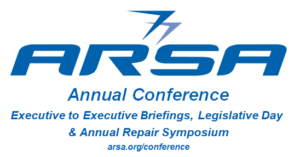2023 – Edition 4 – May 5
Table of Contents
Note: The order of material varies in hotline emails, but is always presented the same on this landing page. Readers scrolling through content on or printing this page will find it organized consistent with the table of contents.
The President’s Desk
2024 Annual Conference
ARSA Works
Creating Careers
Legal Briefs
ARSA on the Hill
Training
Membership
Resources
Industry Calendar
The President’s Desk
What Matters
One of my goals as ARSA’s president is to continue the membership-building momentum of my predecessor. This means using the association’s empowerment of the aviation maintenance industry to act for the singular and collective good. This sense of agency – pun intended – is the lens through which I’ve come to understand the association’s work.
Through that lens, an impactful ARSA member is independent and bold in terms of regulatory compliance. It’s very American, in a way: A seemingly adversarial relationship with rules and the entities that enforce them is an important cultural identity and makes for a good certificate holder. We have all had run ins with governments, streaming service providers, parking enforcement personnel, and other “powers that be”. Just because a person with power or a guidance document “says so” does not make reality.
This doesn’t mean or make “the wild west”, geographically or metaphorically, but rather that businessmen must know enough to focus on what really matters. For all maintenance providers, the performance rules of part 43 drive us to “do…work in such a manner and use materials of such a quality” that we return products and appliances to a condition “at least equal to [their] original or properly altered condition.” While there are organizational requirements and procedural standards to address, the fundamental function of maintenance providers is to uphold that basic standard, while showing compliance with the rules under which our certificates are granted.
While this independent streak is key to the association’s DNA, it’s not necessarily universal. There are certificate and approval holders willing to do whatever the civil aviation authorities tell them. There are government personnel more than happy to pull strings, making certificate holders contort like marionette dolls into positions dictated by guidance or personnel preference and not the plain language of the rules.
Overseas, our European colleagues remain wrapped in the power of paperwork – a fight ARSA continues for the sake of maintaining any value in bilateral agreements – at the expense of both good sense and good parts. Though they might be suitable for installation and traceable to a production approval holder’s quality system, countless articles on repair stations’ shelves can’t be used for European customers because they aren’t accompanied by the right inked-up paper.
While the association fights on the highest level for sensible policies and corrections to misguided governments, our job as members (and professionals) is to stand up for common sense application of the rules. Not only is it right (and downright American, in a sense) to buck the system, it’s essential for the sake of keeping focus on what really matters.
 |
Josh Krotec 2023 ARSA president | First Aviation Services, Inc. senior vice president |
2024 Annual Conference
Save the Date
See you next year: March 12-15, 2024
Click here to download a placeholder appointment and ensure your Outlook calendar is blocked.
2023 Event Information | 2023 Sponsors
These details are provided as a reference for 2023 Conference attendees (materials and session information will remain available via the Digital Companion until 2024) and to instruct those interested in the general presentation of the event for future planning.
Executive to Executive Briefings: Tuesday, March 18, 2025
Participation by industry executives with senior executive branch officials is limited to annual conference sponsors at the Administratium, Platinum, Gold, or Silver levels. In past years, meeting participants included representatives from the U.S. Departments of Commerce, Defense, Labor, State, and Transportation as well as the fellow trade associations and industry interest groups. Schedule Subject to Change9:00 a.m. | Introductory Briefing
10:00 a.m. | U.S. Department of State
Heidi Gomez, Deputy Assistant Secretary for Transportation Affairs, Bureau of Economic and Business Affairs
With an eye to the volatile geopolitical environment, Deputy Assistant Secretary Gomez will discuss issues impacting bilateral relationships, the bilateral negotiation process, and opportunities to influence the development of bilaterals.
11:00 a.m. | Break
11:15 a.m. | Regulatory Reform: Opportunities and Risks
Andrew Langer, President, Institute for Liberty and Director, CPAC Foundation Center for Regulatory Freedom
As an advocate, policy communicator, academic, and radio talk show host, Langer has dedicated his career to building public awareness about the shortcomings of the federal bureaucracy and, more importantly, how to improve government oversight. He will discuss the historic opportunity presented by the Trump administration to improve government operations and how the business community can help steer reform in the right direction.
12:15 p.m. | Talking Trade and Tariffs
Dak Hardwick, Vice President, International Affairs, Aerospace Industries Association, Invited
The aviation maintenance industry is facing supply chain disruptions and the potential impact of tariffs on parts and raw materials. Hardwick will discuss risks in the current environment and opportunities for the aerospace industry to steer the public discussion about aviation manufacturing, trade, and tariffs in the right direction.
1:00 p.m. | Lunch
2:00 p.m. | Importing Talent: Challenges and Opportunities
Laura Footre Reiff, Shareholder, GreenbergTraurig, Founder, Essential Worker Immigration Coalition, Invited
EWIC is a broad-based coalition of businesses and trade associations that support comprehensive immigration reform to address the technical talent shortage. Reiff will discuss opportunities to improve the U.S. immigration system and share strategies for importing talent.
3:00 p.m. | Break
3:15 p.m. | Economic Impacts
Livia Hayes, Director, Market Intelligence Team, Transportation and Services Practice, Oliver Wyman
Hayes will reveal the findings of the most recent Oliver Wyman MRO industry forecast and lead a roundtable discussion of factors and trends impacting demand for aerospace maintenance services.
4:00 p.m. | Wrap Up
Legislative Day: Wednesday, March 19, 2025
The day dedicated to educating both the aviation maintenance industry and elected officials. Learn (or brush up) on what ARSA does and what you can do so you're ready for afternoon visits with targeted Capitol Hill legislators and staff.7:30 a.m. | Registration and Breakfast
8:00 a.m. | Welcome and Introductions
Christian Klein, Executive Vice President, ARSA
Alex De Gunten, Vice President of Government & Industry Affairs, HEICO and ARSA 2025 Government Affairs Chairman
8:15 a.m. | It's All About Your Industry and Your Company
Christian Klein, Executive Vice President, ARSA
9:00 a.m. | The View from the Hill
Karen Huggard, Vice President of Government Affairs, National Air Transportation Association
Jarrod Thompson, Vice President for Legislative and Regulatory Policy, Airlines for America
Moderator: Christian Klein, Executive Vice President, ARSA
9:45 a.m. | Break
10:00 a.m. | National Defense Authorization Act: Accomplishments and Opportunities
Josh Krotec, Senior Vice President, First Aviation and ARSA Immediate Past President
Alex de Gunten, Senior Vice President for Government & Industry Affairs, HEICO and 2024 ARSA Government Affairs Chairman
Mandy Smithberger, Senior Adviser, National Security, Sen. Elizabeth Warren (D-Mass.)
Moderator: Christian Klein, Executive Vice President, ARSA
10:30 a.m. | Strengthening Our Roots
Christian Klein, Executive Vice President, ARSA
11:00 a.m. | Global Fleet & MRO Market Report Release presented by Oliver Wyman
Livia Hayes, Director, Oliver Wyman Vector
11:30 a.m. | Wrap Up
12:00 p.m. | Lunch & Adjourn
1:00 p.m. | Congressional Meetings Begin
TBD | Presentation of 2025 Legislative Leadership Award
TBD | House Aviation Subcommittee Staff Briefing (on Capitol Hill)
4:00 p.m. | Symposium Registration Open (for non-Legislative Day attendees)
5:30 p.m. | Ice-Breaker Reception
7:00 p.m. | Special Invitation Dinner
Annual Repair Symposium: Thursday, March 20, 2025
The centerpiece of Conference week, ARSA convenes a full day of substantive panel discussions covering key regulatory compliance and business issues. After the keynote address, regulators from across the world join the full-morning "Opening Salvo" conversation, followed by lunch and an afternoon of practical regulatory and business discussion.7:30 a.m. | Registration and Breakfast
8:00 a.m. | Welcome and Introductory Remarks – What ARSA Has Done Lately
Sarah MacLeod, Executive Director, ARSA
Christian Klein, Executive Vice President, ARSA
8:30 a.m. | Session 1: Fireside Chat with AIR
Caitlin Locke, Executive Director, Aircraft Certification Service
Moderator: Sarah MacLeod, Executive Director, ARSA
9:00 a.m. | Break
9:30 a.m. | Session 2: Opening Salvo – Conversations with the Regulators
Lawrence Josuá Fernandes Costa, Continuing Airworthiness Certification Manager, Department of Flight Standards, ANAC Brazil, ONLINE
Ludovic Aron, Washington Representative, EASA
Karl Specht, Principal Coordinator Organisation Approvals, EASA, ONLINE
Robert Ruiz, Acting Executive Director, Flight Standards Service, FAA, Invited
Dan Elgas, Director, Policy and Standards Division (AIR-600), Aircraft Certification Service, FAA, Invited
Neil Williams, Head of Airworthiness, Policy & Rulemaking, United Kingdom Civil Aviation Authority
10:45 | Break (Approximate; Session 2 to continue)
12:30 p.m. | Lunch and Special Presentation
2:00 p.m. | Best Approaches to Rulemaking
Tony Fazio, President, Fazio Group International
Lirio Liu, Executive Director, Willow Aviation Advisors
Sarah MacLeod, Executive Director, ARSA
Moderator: Brett Levanto, Vice President of Operations, ARSA
3:00 p.m. | ARSA Quiz Show
3:30 p.m. | Break
4:00 p.m. | More than an Apprentice
Jennifer Evans, CEO, Compressed Gas Systems
Quincy Gellerman, Student
Moderator: Brett Levanto, Vice President of Operations, ARSA
5:00 p.m. | Aerospace Happy Hour
Member Day: Friday, March 21, 2025
ARSA's leadership briefs members on the state of the association as well as goals and priorities for the coming year. Participants then close out the event by participating in breakout and/or training sessions focused on key aerospace topics. The Conference ends by 12:00 p.m. EDT.8:00 a.m. | Annual Membership Meeting and Breakfast
9:30 a.m. | Break
10:00 a.m. | Training Sessions & Breakout Discussions
HazMat Determinations – An ARSA training session on determining whether your company is a Hazardous Materials employer under the rules in 49 CFR and the regulatory requirements that all maintenance providers should heed. (One Hour)
Complying with Foreign D&A Requirements – An ARSA training session helping repair stations get ahead of the December 2027 compliance date for the new rule expanding drug & alcohol testing requirements to facilities located outside the United States. All maintenance personnel, regardless of location, should understand the industry-wide impact of the new rule. (One Hour)
Repairman to Specialist – An open discussion with industry and education leaders on developing career (and certification) pathways through 14 CFR part 65 subpart E.
12:00 p.m. Conference Ends
In-Person
All substantive and social activities were hosted at the Ritz-Carlton, Pentagon City in Arlington, Virginia. Legislative Day participants will head to Capitol Hill for meetings with congressional offices as appropriate.
Livestream
The majority of Conference events will be available to livestream viewers via a Vimeo web-player embedded into a page on ARSA.org. All in-person registrants will be able to name a "Conference Ambassador" as a contact to access the livestream and bring the event back to their home facilities. Paying registrants for livestream access may share with multiple company contacts. Livestream participation will include a mechanism for submitting questions to onsite personnel.
Pricing
| Executive to Executive Briefings | ||||
| Open to Administratium, Platinum, Gold, and Silver-level sponsors. | ||||
| Legislative Day – Wednesday, March 19 | ||||
| Members | Non-Members | |||
| First | Additional | First | Additional | |
| In-person | $400 | $360 | $600 | $540 |
| Livestream Free with in-person registration. | $400 | $600 | ||
| Symposium – Thursday, March 20 | ||||
| In-person | $900 | $810 | $1,250 | $1,125 |
| Livestream Free with in-person registration. | $900 | $1,250 | ||
| Legislative Day & Symposium Bundle | ||||
| In-person | $1,100 | $990 | $1,500 | $1,350 |
| Livestream Free with in-person registration. | $1,100 | $1,500 | ||
| The Super Bundle (Silver Sponsorship, E2E, Legislative Day, & Symposium) | ||||
| In-person | $4,200 | $4,500 | ||
| Livestream Free with in-person registration. | ||||
| Member Meeting & Training/Breakouts – Friday, March 21 | ||||
| In-person | Free with Symposium registration. | |||
| Livestream | ||||
(2) Registration fees may be waived for government personnel, members of the media, speakers, and other support personnel or special guests upon approval by the ARSA event team.
Administratium – $20,000
What is Administratium? An element aerospace professionals see every day (click here to learn more). Notation in all publicity, marketing and periodicals (e.g., the hotline, Dispatch, ARSA team email signatures, conference attendee contact list, specific email alerts to association contacts), recognition in event materials and from the podium, specific thank you in ARSA periodicals, additional advertising placement via ARSA’s communications, complimentary registrations for three (3) participants in the Executive to Executive Briefings as well as three (3) in Legislative Day, and free livestream access for personnel unable to attend in person. At the Administratium Level, sponsors may select one of the following* to specifically support (please note the list in this document does not reflect current availability):- Annual Repair Symposium – Ice Breaker Reception
- Annual Repair Symposium – Thursday Happy Hour
- General Sponsorship
Platinum – $10,000
Notation in all publicity, marketing and periodicals (e.g., the hotline, Dispatch, ARSA team email signatures, conference attendee contact list, specific email alerts to association contacts), recognition in event materials and from the podium, specific thank you in ARSA periodicals, complimentary registrations for three (3) participants in the Executive to Executive Briefings as well as three (3) in Legislative Day, and free livestream access for personnel unable to attend in person. At the Platinum Level, sponsors may select one of the following to specifically support (may not reflect current availability for 2025):- Online Conference Experience
- Executive to Executive Briefings
- Legislative Day – All Day
- Congressional Directories/Resources
- General Sponsorship
2024 Platinum Sponsors
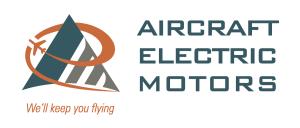 |
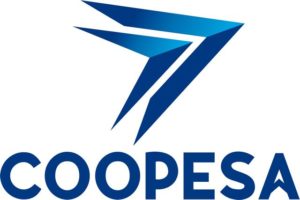 |
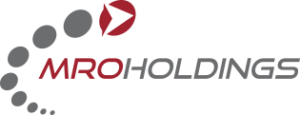 |
Gold – $7,500
Notation in all publicity, marketing and periodicals (e.g., the hotline, Dispatch, ARSA team email signatures, conference attendee contact list, specific email alerts to association contacts), recognition in event materials and from the podium, specific thank you in ARSA periodicals, complimentary registrations for two (2) participants in the Executive to Executive Briefings as well as two (2) in Legislative Day, and free livestream access for personnel unable to attend in person. At the Gold Level, sponsors may select one of the following to specifically support (may not reflect current availability for 2025):- Legislative Priorities Brochures/Resources
- Digital Companion/Electronic Materials
- Legislative Day – Continental Breakfast
- Legislative Day – Congressional Briefing and Luncheon
- Annual Repair Symposium – Continental Breakfast
- Annual Repair Symposium – Luncheon with Special Guest
- Nametag Lanyards
- Hotel Room Keys
- General Sponsorship
2024 Gold Sponsors
Silver – $3,500
Notation in all publicity, marketing, and periodicals (e.g., the hotline, Dispatch, ARSA team email signatures, conference attendee contact list, specific email alerts to association contacts), recognition in event materials and from the podium, complimentary registrations for one (1) participant in the Executive-to-Executive Briefings as well as one (1) in Legislative Day. At the Silver Level, sponsors may select one of the following to specifically support (may not reflect current availability for 2024):- Annual Repair Symposium – Coffee Break (5)
- General Sponsorship
2024 Silver Sponsors
Supporter – $2,500
Notation in all publicity, marketing, and periodicals (e.g., the hotline, Dispatch, ARSA team email signatures, specific email alerts to association contacts), and recognition in event materials and from the podium.Contributor – $500 to $2,499 (or equivalent support)
Notation in some publicity, marketing, and periodicals (e.g., the hotline, Dispatch), and recognition in event materials and from the podium.2024 Contributors
 |
ARSA's block of rooms for Conference participants at the Ritz-Carlton, Pentagon City in Arlington, Virginia is now closed. The hotel hosts most of the activities related to the ARSA Conference and is convenient to the Metro as well as Washington Reagan National Airport (DCA). To try and book a room independently, go to the hotel's website or call 703.415.5000.
Those seeking other options may consider these hotels (there are no ARSA-related specials or promotions at these locations):
Embassy Suites by Hilton Crystal City National Airport, 1393 S Eads Street Arlington, Virginia, 22202
Residence Inn Arlington Capital View, 2850 South Potomac Avenue Arlington, Virginia, 22202
DoubleTree by Hilton Hotel Washington DC – Crystal City, 300 Army Navy Drive Arlington, Virginia, 22202
Crowne Plaza Washington National Airport, 1480 Crystal Drive Arlington, Virginia, 22202
Hampton Inn & Suites Reagan National Airport, 2000 Richmond Highway Arlington, Virginia, 22202
Radisson Hotel Reagan National Airport, 2020 Richmond Highway Arlington, VA 22202
Holiday Inn National Airport/Crystal City, 2650 Richmond Highway Arlington, Virginia, 22202
The Leo Weston Award for Excellence in Government Service
First bestowed on Leo Weston himself in 2005, the Weston award honors an instrumental figure in ARSA's birth by recognizing individuals who embody his commitment to the industry's safety and success. The symposium provides a venue for association members and invited guests from around the world to network and discuss issues that matter to the aviation maintenance industry. It is the perfect time to respect the history of the repair station community and honor the good works of those who support it.
Click here to learn more about Leo, the award bearing his name, and those who have received it.The Legislative Leadership Award
The association regularly recognizes members of Congress who have provided outstanding support to the aviation maintenance community by supporting policies beneficial to the industry. Honorees have each been key in moving forward specific legislation advancing priorities championed by ARSA on behalf of its members.
Click here to see past updates regarding Legislative Leadership Award recipients.The "Golden Shovel" Award
From time to time, ARSA recognizes individuals – usually at the time of their retirement – who have spent their careers in steadfast devotion to good business, good safety, and good oversight. In the colorful illustration of Executive Director Sarah MacLeod, these professionals have spent their lives shoveling against the tide of government bureaucracy; their achievement in never giving up is acknowledged through the "Golden Shovel Award."
Click here to learn more about the "Shovel" and see who has received it.Event Photos
ARSA has created a Google Album including photos taken during the 2025 Annual Conference, which allows participants to share their own photos (Sharing event photos constitutes consenting to their use/distribution in association with Conference-related publicity for this or future events, at ARSA’s discretion). To see the album, click here.Recordings
Complete "raw" recordings are accessible by attendees via the Digital Companion. The ARSA team will utilize recorded content throughout the year in support of its communications. If you’re looking for a specific segment or need assistance with a recording, contact ARSA.ARSA Works
What Has ARSA Done Lately – First Quarter 2023
Each quarter the board of directors receives reports on the association’s activities and fiscal health. Step into a board member’s shoes with this overview of the financial, operations, legislative, and regulatory reports highlighting advocacy on behalf of aviation safety in 2023’s first quarter.
Fiscal Health
The successful administration of the 2023 Annual Conference put the association in a strong cash position by the end of the quarter. The team and board are planning activities for the remainder of the year that will bolster revenue in months when the number of expected membership renewals is low.
Membership
The renewal rate remained better than 90 percent – a milestone reached in 2022 – for the first three months of the year. New member applications outpaced lapsed memberships, most of which are still in the association’s retention process (so only a portion of those lapsed organizations will become canceled).
Regulatory Advocacy
- Reported on December acceptance by ARAC of final report from working group tasked to reconcile part 145 with FAA guidance.
- Announced selection by FAA of Executive Director Sarah MacLeod to serve on Organization Designation Authorization Expert Panel.
- Gathered feedback regarding noticed of proposed rulemaking to expand applicability of 14 CFR part 5 for Safety Management Systems.
- Continued support for Office of Information and Regulatory Affairs (OIRA) public engagement related to the regulatory process.
- Delivered letter to FAA and EASA seeking to correct bilateral misinterpretation related to parts documentation. Announced establishment of working group to review issue.
- Invited to participate in FAA International Stakeholders coordinating meetings.
- Proposed content (and speaker support) for June FAA-EASA International Safety Conference (Cologne).
Legislative and Lobbying
- Developed ARSA FAA reauthorization recommendations; distributed to appropriate House and Senate offices; conducted briefing for House Aviation Subcommittee staff.
- In response to congressional request based on Legislative Day meeting, provided recommendations to Sen. James Lankford (R-Okla.) re: improving the repair station certification process.
- Coordinated meeting of leading aviation trade associations to develop consensus workforce recommendations for FAA reauthorization.
- Coordinated with leading ARSA members to develop plan to seek language in National Defense Authorization Act (NDAA) directing Department of Defense to accept FAA approvals (i.e., DER repairs and PMA parts) for maintenance on commercial derivative aircraft (CDA) and to improve access to instructions for continued airworthiness for CDA.
- Attended Feb. 7 event for new House Aviation Subcommittee members.
Communications and Surveys
ARSA in the News – Selected Industry Coverage
Working Group Calls For Unified Repair Station Guidance
January 17, 2023 | AviationWeek
Working group membership includes representatives from about 20 aircraft, engine, and component manufacturers as well as dedicated repair stations, labor groups and industry associations. Aeronautical Repair Station Association Executive Director Sarah MacLeod and Aircraft Electronics Association VP of Government and Regulatory Affairs Ric Peri are the Part 145 working group’s co-chairs.
NTSB Renews Call For Repair Station SMS Mandate
March 20, 2023 | AviationWeek
The FAA’s SMS rollout has come with voluntary programs that many companies adopted in advance of mandates. According to the agency, 72 repair stations have SMS systems, with 19 recognized by the FAA as being “fully functioning,” Acting FAA Administrator Billy Nolen said at the recent Aeronautical Repair Station Association (ARSA) annual conference.
ARSA Navigates Workforce, Regulatory Challenges
March 22,2023 | AviationWeek
The most recent gathering of the U.S.’s Aeronautical Repair Station Association (ARSA) saw attendance returning toward pre-COVID levels and a great turnout for a full day of lobbying legislators on Capitol Hill.
Kelly, Collins Lead Bipartisan Coalition to Introduce Aviation Workforce Development Act
March 28, 2023 | Congressman Mike Kelly
U.S. Representatives Mike Kelly (R-PA), Mike Collins (R-Ga.), Jimmy Panetta (D-Calif.), and Aviation Subcommittee Ranking Member Steve Cohen (D-Tenn.) introduced the Aviation Workforce Development Act, a bill to make training at FAA-certified commercial pilot and aircraft maintenance technician schools a qualified expense for existing 529 Plans.
ARSA-placed Industry Editorials and Content
| AMT Magazine | First of its Kind January/February | Brett Levanto |
| Reauth is Coming, Reauth is Coming! April/March | Brett Levanto |
|
| Aviation Week | New Congressional Leaders Will Shape U.S. Aviation Policy January | Christian Klein |
| Improving Aviation Policy Requires Persistence February | Christian Klein |
|
| Perseverance Pays Off In Regulatory Compliance March | Marshall S. Filler |
|
| DOM Magazine | Setting an Example February | Brett Levanto |
| Managing Questions March | Brett Levanto |
Website Pageview Analysis
The table displays the top 10 most-visited pages on ARSA.org in each month of Q1. The parentheses display the number of pageviews for each – total for each month in the header – along with the percentage of total. NOTE: The links direct to the current version of each page; those that are regularly updated, e.g., “All News,” had different content at the top depending on when they were accessed.
Bringing Advertising In-house
- Scripts developed for advertiser outreach and sales.
- Engagement began with first round of advertisers “expiring” after turnover from Multiview.
- Will expand sales engagement to a broader range of members.
Surveys
- Administered 2023 Member Survey; initial data show 65 responses. Plan to release reportable data in April hotline.
- 65 responses (95% repair stations).
- Satisfaction with ARSA membership: 4.66 out of 5.
- Value of ARSA services:
- Access to expertise (4.64)
- Regulatory compliance support (4.64)
- Free compliance resources (4.27)
- Newsletters (4.12)
- Congressional advocacy (4.11)
- Online training (4.04)
- Events (4.00)
- RSQM Compilation (3.88)
- Quick Questions:
-
- Impact of SMS Proposal (40 responses)
- Conference Feedback (12 responses)
-
- Flash Survey on Proposed SMS Regulation (67 responses)
Events, Meetings and Training
Events—Annual Conference
2023 Annual Conference (March 14 – 17) at Ritz Carlton Pentagon City (in-person and livestreamed).
| 2023 | 2022 | 2020 | 2019 | |
| Sponsoring Organizations | 21 | 19 | 20 | 21 |
| Symposium Participants | 166 | 117 | 131 | 126 |
| Leg Day Participants | 62 | 35 | 39 | 52 |
| E2E Participants | 24 | 18 | 15 | 26 |
Platinum Sponsors
 |
 |
 |
 |
Gold Sponsors
Silver Sponsors
Supporter
Contributors
External Meetings
- Sarah participated in multiple meetings of FAA’s Aviation Rulemaking Advisory Committee (ARAC) and working groups.
- Christian attended TSA Aviation Safety Advisory Committee (ASAC) and insider threat subcommittee meetings.
- Sarah attended multiple FAA AIR Tag up meetings.
- Sarah attended multiple meetings regarding ODA Standards.
- Christian took part in multiple Maintenance Management Team (MMT) coordination meetings.
- Christian and Brett met with Karen Huggard of NATA regarding workforce policy (Jan. 10).
- Marshall and Christian had a meeting with Ric Peri of AEA to discuss the JMCB/COB letter (Jan. 17).
- Marshall and Christian met with Joe Sambiase and Walter Desrosier of GAMA regarding the JMCB/COB letter (Jan. 23).
- Brett spoke with Erica Forti of Mellilo Middle Scholl in East Haven, CT to learn about the school’s aviation program with BSA and Avelo Airlines (Jan. 23).
- Christian had lunch with Keith Deberry and Karen Huggard of NATA (Jan. 25).
- Christian had a meeting with Rich Efford of AIA regarding FAA reauthorization (Jan. 27).
- Christian met with Bob McEntire from the U.S. Dept. of Commerce regarding E2E (Jan. 27).
- Christian had lunch with Dan Hillenbrand of Sen. Katie Britt’s (R-Ala.) office (Jan. 27).
- Brett spoke with Paul Lukas from the Boy Scouts of America on career development (Jan. 31).
- Christian met with Rich Efford of AIA regarding the FAA reauthorization (Jan. 31).
- Christian had lunch with the AAR Government Affairs team regarding ICA issues (Feb. 6).
- Christian attended a House Transportation and Infrastructure Committee “Meet the Members” event (Feb. 6).
- Brett met with Tarra Ruttman of ChooseAerospace regarding the industry scholarship review process (Feb. 13).
- Christian and Brett participated in an FAA reauthorization workforce meeting with industries allies at AIA coordinated by ARSA (Feb. 23).
- Christian and Marshall had multiple meetings with Conference Opening Salvo panel members to discuss content.
- Sarah led a meeting with the FAA Flight Standards representatives about the ARAC Working Group on part 145 (Feb. 28).
- Sarah, Christian and Marshall attended and presented at the HAI Heli-Expo in Atlanta (Mar. 6-7).
- ARSA Annual Conference (Mar. 14-17).
- Christian met with the House Aviation Subcommittee staff on FAA reauthorization priorities (Mar. 24).
- Sarah and Brett met with the GAO to discuss aviation manufacturing and supply chain challenges (Mar. 27).
- Christian attended an FAA International Affairs Stakeholders meeting (Mar. 28)
- Christian and Ric Peri of AEA met with Theresa Jeffrey of Sen. Lankford’s office regarding improvements to repair station certification process (Mar. 30).
- Christian, Sarah, and Ric Peri of AEA met to review FAA reauthorization repair station certifications and recommendations (Mar. 31).
ARSA, AEA Push Back Against SMS Expansion
In joint comments submitted to the FAA on April 11, ARSA and the Aircraft Electronics Association (AEA) opposed the potential expansion of the agency’s Safety Management System (SMS) rules contained in 14 CFR part 5 to include repair stations certificated under part 145.
The comments were submitted in response to the FAA’s Jan. 11 proposal to update and expand the requirements for SMS and require certain certificate holders and commercial air tour operators to develop and implement an SMS program. While certificated repair stations were not included in the proposed SMS rule, the FAA requested comments and information regarding a future rulemaking project to expand the applicability of 14 CFR part 5 to include repair stations.
As part of the rulemaking process, the FAA must assess and substantiate the economic burden by establishing the requirement would increase safety. The agency was unable to do so when attempting to apply quality assurance to U.S.-based repair stations in its 1999 rulemaking. Therefore, it is unlikely the FAA could validate an increase in safety to justify the burden of implementing and maintaining an SMS, particularly on small businesses.
In support of this effort, ARSA conducted a survey of its members the week of April 3. Ninety-four percent of respondents opposed a future rulemaking to expand the applicability of part 5 to repair stations, 97 percent opposed applying part 5 to all repair stations, and 96 percent opposed limiting the applicability to a certain subset of repair stations.
“Part 145 already has a robust quality management system as required by 14 CFR §§ 145.209 and 145.211. This is not to assume that the quality management system is perfect and that it could not be enhanced with continuous improvement however, the FAA is already overseeing repair station certification and operations through its Safety Assurance System with many of the 3 elements contained within SMS such as risk assessment and management, change management, and promotion and outreach,” ARSA and AEA said. “The FAA should declare 14 CFR part 145 combined with the Agency safety assurance oversight of repair station to be SMS complaint.”
To read the ARSA-AEA joint comments, click here.
For more on AEA’s SMS advocacy, click here.
To submit your own comments and access the SMS docket, click here. (Note: While the comment period closed on April 11, agencies may still consider late-filed comments.)
FAA Can’t Help Itself on IA Renewal Policy
On April 10, the FAA informed providers of Inspection Authorization renewal courses that applications for acceptance can now be made on the new Form 8610-6. The document’s release is part of the agency’s multi-year overhaul of its procedures and guidance for managing acceptance of IA training. Although an updated advisory circular for course management and credit remains in development, the FAA has prioritized beginning to accept applications under the new guidance in Order 8900.1.
Unfortunately, the policy updates double down on the most unwieldy elements of the previous FAA process. The new procedures in 8900.1 simply rearrange various responsibilities, tweak communications steps, and extend timelines but do nothing to balance the system’s complexity with the simplicity of § 65.93(a)(4).
In October 2021, ARSA submitted comments on the still-in-production draft AC to provide overarching encouragement to the FAA for enabling such simplicity. The association’s comments continued years of dialogue regarding the flexibility afforded by the words “acceptable to” in the rule (see arsa.org/ia-guidance for full background). ARSA provided its own draft guidance that would allow the government to eliminate individual training review, remove unnecessary time restrictions, and refocus attention on mechanics seeking acceptance rather than expending resources on provider oversight.
The new policy fails to offer new industry flexibility and does not significantly decrease bureaucratic burden. Given the value of broad access to professional training, ARSA will continue to focus on ways to streamline credit acceptability while pressing the government to improve how it supports professional and technical growth not only in the industry but also in its own ranks.
Stay tuned to ARSA for continued efforts related to career development and training. The association’s 22 sessions that have been found acceptable for IA renewal credit will remain valid through 2026.
To read the new language in Order 8900.1, click here.
To see ARSA’s IA renewal training sessions, click here.
Final Documents/Your Two Cents
This list includes Federal Register publications, such as final rules, Advisory Circulars and policy statements, as well as proposed rules and policies of interest to ARSA members.
Creating Careers
Doing It All – 2023 ARSA Scholarship Winner Joel Mink
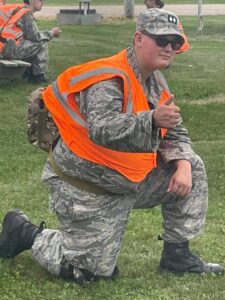
2023 ARSA Scholarship Winner Joel Mink.
In March, ARSA awarded its 2023 scholarship to Joel Mink, a first-year student in the AMT program at Cincinnati State Technical and Community College.
The grant is part of Choose Aerospace’s Aviation Maintenance Scholarship and Award Program. ARSA and its partner organizations combined tens of thousands of dollars’ worth of scholarships, textbooks, training systems, and testing fee credits for educators and future aviators. The association assisted in reviewing applications for all awards; while this year’s candidates were universally excellent, Mink’s broad interest in aerospace and commitment to maintenance skills as a point-of-entry into a long industry career made him stand out among his peers. He officially received his award during the Annual Conference of the Aviation Technician Education Council (ATEC).
Mink answered a few questions for ARSA’s communications team. His answers underscore his practical approach to learning and desire to build many skills of value to aviation businesses. The association encourages members to get to know him, not only to learn about the value of investment in the scholarship, but also to learn from the example of a future aviation professional.
(1) You’ve committed yourself to developing a broad range of experience in aviation, particularly through Civil Air Patrol, how has that effort paid off now that you’re in school?
There is no substitute for hands-on experience. I’m extremely grateful for Trego-Dugan Aviation for my first job at an airport as a ground maintenance assistant and for the Civil Air Patrol for providing me multiple opportunities to fly planes. Thanks to what I have learned through these experiences, I can better understand my AMT instructors. I can visualize what they are talking about rather than just seeing photos in a book or on a slideshow. Also, I sometimes see an issue at work and have an “aha” moment when I realize that we just learned about that in class. I would not be able to have these advantages without both my Civil Air Patrol and Trego-Dugan experiences.
(2) What has the experience been like with your classmates, particularly in seeing the different backgrounds and pathways that brought others into aviation?
Everyone has a story, and that is especially true at Cincinnati State. There are people from all backgrounds, ages, etc. However, we all work together to help each other learn the material and perform the labs. The AMT program really is a family atmosphere. Between classes we even go outside and throw a football to relax.
(3) What have you found to be most surprising/unexpected about AMT school?
The most surprising aspect about AMT school for me has been the number of recruiters coming to campus looking for A&Ps. I had read about a shortage, but I had no idea it would be so dire that recruiters would come to school and offer huge bonuses to anyone that would come work for them.
(4) Other than becoming an ARSA member (kidding…but seriously), what are your goals for life after school?
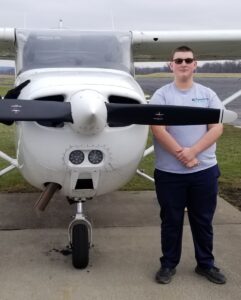
2023 ARSA Scholarship Winner Joel Mink.
My short-term goal after college is to gain more hands-on experience by working at a larger repair facility. My long-term goal is to own my own airplane repair facility for general aviation planes.
(5) To help ARSA’s members understand the value of the scholarship, tell us about the expenses you have to cover while at school.
The normal expenses are well known coming into college: Tuition, books, and fees are published by the college. What is surprising is the number of tools that I am continuing to purchase. It seems like every couple of weeks I need a specialized tool to accomplish a task required by one of my class labs, and I have learned quickly that the price of a tool increases dramatically if the word “aviation” is in front of it. Add the price of transportation (gasoline) on top of that and the expenses add up quickly.
(6) If you learned that someone was considering school/career choices and they asked you about aviation maintenance, what would you say?
To be an AMT, you absolutely must love grease. If you are afraid of hard work and getting dirty, then this field probably is not for you. If you live, breathe, and dream about airplanes then this is exactly where you belong because you will never be closer to aviation than when you have an engine apart in your work area. It is a wonderful field, but you have to go into it knowing that there are days that you will go home smelling like hydraulic fluid.
(7) What do you think industry professionals should know in order to be most helpful in helping you and others to build aerospace careers?
The hardest barrier of entry for me into the aviation industry has been finding that first AMT job. There are plenty of jobs out there for those with full A&P certifications, but the few internships/co-op positions that do not require a full A&P are not well publicized. Even the AMT recruiters that have visited my campus do not seem to know of many opportunities to gain the necessary hands-on experience required for an A&P. I have been very blessed by working at KCVG and having made numerous contacts within the local AMT community, but most students do not have this advantage.
Get to know Joel even better by reviewing his application package for the ARSA Scholarship, which he agreed to share with the public. Click here to see his incredibly thorough answers to the review committee’s questions.
To learn more about the Choose Aerospace Scholarships and Awards Program, click here.
For more information on ARSA’s broader efforts to support industry career development, visit arsa.org/workforce.
Want to congratulate Joel? Help with his interest in gaining hands on experience? Learn more about how to find great candidates like him? Contact ARSA for a referral.
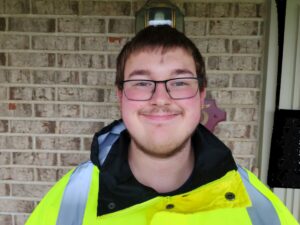
2023 ARSA Scholarship Winner Joel Mink.
Legal Briefs
Editor’s note: This material is provided as a service to association members for educational and informational purposes only. It does not constitute legal or professional advice and is not privileged or confidential.
Non-Bilateral Maintenance Exports
By Christian A. Klein, Executive Vice President
ARSA has sparred with the FAA and European Union Aviation Safety Agency (EASA) for more than a year over parts documentation requirements applicable to U.S. repair stations working under the U.S.-EU Bilateral Aviation Safety Agreement (BASA).
Following a change in the U.S.-E.U. BASA Maintenance Annex Guidance (MAG) in 2015, EASA demanded that every new replacement part installed during maintenance under the BASA be accompanied by an FAA Form 8130-3 form (or EASA Form 1) traceable to the production approval holder (PAH). Last year, the FAA and EASA formally withdrew acceptance of an ARSA-designed process to inspect an article under part 43, document the inspection, and issue an 8130-3 with a right-side signature. U.S. repair stations and parts distributors are now stuck with large and expensive parts inventories that are not usable in a dual release work scope because they lack proper paperwork.
In January, ARSA and 14 other organizations sent a letter to the EASA-FAA Joint Maintenance Coordination Board (JMCB) and Certification Oversight Board (COB) arguing the agencies are misreading the BASA and using it to improperly justify EASA’s paperwork demand. The FAA and EASA have since convened a working group to address the issue, but resolution may take a year or more.
The parts documentation imbroglio has some wondering whether MAGs are worth the trouble. Would it be easier to export a maintained component with new parts installed if the bilateral did not address maintenance?
Subpart L of 14 CFR part 21 addresses export airworthiness approvals. When it comes to exporting maintained (used) articles, § 21.331(c) states that, “[a] person may obtain from the FAA an export airworthiness approval to export a used aircraft, engine, propeller, or article if it conforms to its approved design and is in a condition for safe operation.”
Per § 21.335, in the absence of a bilateral or other agreement with the importing country, the exporter of an article must forward to the importing country or jurisdiction all documents specified by that country or jurisdiction and preserve and package products and articles as necessary to protect them against corrosion and damage during transit or storage and state the duration of effectiveness of such preservation and packaging.
AC 21-2L provides further guidance. It states that any person exporting a product, article, or part under the provisions of part 21, subpart L must meet the requirements of the respective importing country or jurisdiction. Those requirements are explained in bilateral agreements or, in many cases, in “special requirements” submitted to the FAA by foreign authorities, which are detailed in Appendix 2 of AC 21-2. If the importing country or jurisdiction has a BASA with the United States, the BASA will prevail if it conflicts with the special requirements. A complete listing of FAA BASAs is at www.faa.gov/aircraft/air_cert/international/bilateral_agreements/baa_basa_listing.
We reviewed the special requirements for exporting articles to Australia, Brazil, Japan, Saudi Arabia, and South Korea. Some require an FAA Form 8130-3 or equivalent issued under subpart L. In other cases, all that is required is an FAA Form 8130-3 issued as an approval for return to service under part 43.
The takeaway is none of the countries require FAA Form 8130-3s for the new articles installed during maintenance. The focus is on the top-level assembly’s conformity to an approved design and condition for safe operation.
ARSA remains committed to the concept of BASAs and MAGs, which generally reduce compliance costs, but as the parts documentation debacle demonstrates, the framework needs improvement to achieve the goal of enhanced efficiency for regulators and industry alike.
Editor’s note: This material is provided as a service to association members for educational and informational purposes only. It does not constitute legal or professional advice and is not privileged or confidential.
Layman Lawyer – Why Are We This Way?
By Brett Levanto, Vice President of Operations
ARSA’s communications have been full of updates related to bilateral aviation safety agreements this past year. Months of grappling with parts documentation misinterpretation between the FAA and EASA led this layman lawyer to ask if international regulatory partnerships are really worth the trouble.
Answering that question is practical for a maintenance business: Should a repair station/approved maintenance organization opt for a “full up” certification/approval under the foreign CAA’s rules? Does the bilateral have so many strings attached that untangling them outweighs any efficiencies gained?
The apt policy question, then, is how did we get here? Figuring out the history of those strings and the bureaucracies that have tied them together is important for answering practical questions and perhaps improving the system. Understanding the realities of coordination between aviation authorities, particularly those tied to the United States, requires looking at how international agreements are instigated and constructed.
Under U.S. law, a bilateral is an executive agreement between governments. Congress has no direct say like it would in ratifying a treaty, though global politics loom large. In other countries or regional authorities such as EASA, a bilateral aviation safety agreement (BASA) is considered a treaty which means, in effect, that it takes primacy over domestic regulations. That is not the situation in the United States.
The basic process for establishing a bilateral agreement is laid out in ARSA’s online training session “Going Global – Bilateral Agreements”: A foreign entity begins the official process by sending a “diplomatic note” to the U.S. State Department, which sets off what could be years of review beginning with the FAA’s determination of need followed by a technical assessment performed by the Inter Agency Group for International Aviation Approval (IAGIAA). This group has participants from multiple American government agencies, including the Departments of Treasury, Commerce, State, and Defense, each assessing different elements of the foreign entity’s regulatory system, economic realities, and political contingencies.
After those assessments and coordination, the bilateral agreement becomes official followed by the signing of Implementation Procedures for Airworthiness (IPA) or Technical Implementation Procedures (TIP; the term used for the IPA under the U.S./EU bilateral). In many cases this document, which covers design approvals, production approvals, and exports, forms the entirety of the technical agreement between the authorities. If there are agreements concerning maintenance (e.g., Maintenance Implementation Procedures (MIP), Maintenance Annex [or Agreement] Guidance (MAG)), simulators, or other regulatory areas of interest, they will follow later.
ARSA’s crusade that there be “no TIP without a MAG” in bilateral negotiations is a result of the long-term problems produced by this hyperfocus on design, production, and exports at the expense of holistically embracing every link in the regulatory chain. Historically, the FAA’s resources on bilateral agreements falls under its Aircraft Certification Service, which explains: “The U.S. only enters into Bilateral Aviation Safety Agreement with Implementation Procedures for Airworthiness with countries that have an existing aircraft manufacturing industry with products to be exported to the U.S.”
Trying to improve international collaboration through a focus only on certification issues is misguided. It ignores the complexity of ICAO’s assignment of regulatory authority. Since each of the 191 states of registry controls its maintenance requirements, making the presence of manufacturing the prerequisite for bilateralism and therefore its guiding star makes continuing airworthiness problematic.
In that “Going Global” training, ARSA’s Marshall Filler opined that design and manufacturing lead the way in bilateral negotiations because they are “simpler” in terms of assigning responsibility (despite requirements to get multiple international certifications for an aircraft, there is usually only one State of Manufacture). The sad truth, illustrated all too well by the pains of repair stations and approved maintenance organizations under the FAA-EASA MAG, is that letting those activities control focus in international oversight results in nothing simple at all.
ARSA on the Hill
Senators Introduce Foreign Repair Station Bill
Senators Shelley Moore Capito (R-W.Va.) and Tammy Baldwin (D-Wis.) introduced legislation that would impose new rules on foreign repair stations performing heavy maintenance on U.S. air carrier aircraft.
The Global Aircraft Maintenance Safety Improvement Act (S. 1256) is a slightly modified version of anti-foreign repair station legislation that passed the House in 2022. While the legislation was significantly improved (and renamed from “the Safe Aircraft Maintenance Standards Act”) during House T&I Committee negotiations last spring, it would still impose new and unnecessary burdens on U.S. air carriers, foreign repair stations, and their employees, and potentially expose U.S. facilities to foreign retaliation.
The legislation requires:
- Inspections of foreign repair stations without notice to the facility.
- Annual reporting by airlines to the FAA about where heavy maintenance is performed outside the United States and any defects discovered within 30 days of an aircraft’s return to service.
- Direct certification by the FAA of supervisory personnel and those authorized to approve an article for return to service at foreign repair stations performing heavy maintenance unless the FAA determines that those individuals are already certificated under an equivalent regime.
- FAA publication of a final drug and alcohol testing rule within two years of the bill’s enactment. If the agency fails to finish the assignment on time, the FAA administrator would be required to personally approve all international travel by FAA employees.
- Security threat assessments for foreign repair station employees.
Parallel legislation (H.R. 1716) was introduced in the House by Rep. Marcus Molinaro (R-N.Y.) on March 22. It includes additional restrictions, such as a prohibition on U.S. air carriers contracting for maintenance or the FAA issuing new certificates in countries that have Category 2 status based on the FAA’s International Aviation Safety Assessment. H.R. 1716 has 33 cosponsors.
ARSA opposes the legislation for several reasons, including the absence of any safety issue, a lack of FAA resources to accomplish all the bill requires, additional costs and burdens for foreign repair stations and their airline customers, and the risk of tit-for-tat retaliation against U.S. facilities by foreign authorities. While unions representing airline mechanics have promoted anti-contract maintenance language for decades, this is the first time a Senate bill has been introduced, let alone one with Republican support.
U.S. ARSA members are encouraged to contact their members of Congress to express opposition to the bill; foreign members should contact their embassies in Washington, D.C. or their home authorities to express concerns.
|
Want to Learn More About ARSA PAC? ARSA’s Political Action Committee helps elect congressional candidates who share ARSA’s commitment to better regulation and a strong aviation maintenance sector. In this critical election year, ARSA PAC has never been more important. But ARSA is prohibited from sending PAC information to members who haven’t opted in to receive it. Please take a second to give us prior approval to talk to you about ARSA PAC. Doing so in no way obligates you to support PAC. It just opens the lines of communication. Click here to give ARSA your consent today. |
Nolen Departure Complicates FAA Administrator Search
Acting FAA Administrator Billy Nolen announced in April he would leave the agency this summer. Nolen, who was initially hired as associate administrator for aviation safety (AVS), has been serving as the agency’s temporary head since Steve Dickson left the agency more than a year ago.
Phil Washington, the Biden administration’s nominee to permanently replace Dickson, withdrew from consideration after failing to win support from key senators, including Ted Cruz (R-Texas), the senior Republican on the Senate’s Commerce, Science and Transportation Committee. While many thought Nolen would be an excellent choice to be the new agency head, the White House apparently disagreed (possibly to avoid handing Cruz, who had endorsed Nolen as a potential nominee, a political victory).
The White House must now identify another candidate with sufficient aviation experience to be credible (Washington had just one year running the Denver airport) but not so much that he or she is perceived as being “too cozy” with industry. The candidate will also have to be willing to assume leadership of an agency with considerable staffing and management challenges and be the public lightening rod for anything that goes wrong in the U.S. aviation system.
See Nolen’s keynote address from ARSA’s 2023 Annual Conference (video plays in embedded player below).
Workforce in the Spotlight at House Av Subcommittee Hearing
The House Aviation Subcommittee’s April 19 hearing explored the workforce challenges plaguing the aviation industry with an eye to including solutions in the upcoming FAA reauthorization bill. Testifying at the hearing were:
- Faye Malarkey Black, President and Chief Executive Officer, Regional Airline Association
- Sharon B. DeVivo, President, Vaughn College and chair of the Youth Access to American Jobs in Aviation Taskforce.
- Brad Threenss, President and Chief Executive Officer, FlightSafety International
- Heather Krause, Director, Physical Infrastructure, U.S. Government Accountability Office
- Captain Jason Ambrosi, President, Air Line Pilots Association, International
Witnesses proposed various solutions, including doubling Pell grants to provide more educational opportunities for low-income students, raising the mandatory pilot retirement age to 67, increasing funding for Sec. 625 workforce grant programs created at ARSA’s urging in 2018, improving military transition to civilian jobs, and increasing opportunities to use new and advancing technologies in pilot training.
Click here to access a recording of the hearing and copies of each participant’s written statement (you may also view the recording in the embedded video below).
Bill Would Allow 529 Spending on Maintenance Education
Rep. Mike Collins (R-Ga.) is building support for a bill to help prospective aviation professionals access more financial resources. The Aviation Workforce Development Act (H.R. 1818) would allow students to use money in their 529 college savings funds to pay tuition at part 147 technician schools and part 61 and 141 flight schools. The bill has 48 bipartisan cosponsors and broad support in the aviation stakeholder community.
Aviation Life Calendar
May Through July
Something exciting happens every day in an aviation career.
If you want to keep aviation in the forefront of career choices, celebrate success every day with these resources. Every one provides a positive view of the industry’s ability to make the impossible an everyday event by individuals from every walk of life, socio-economic level, race, creed, color, religion, orientation, and physical capability.
Check back regularly for updates.
Training & Career Development
Make ARSA Training Work
ARSA’s online training program represents its most-valuable benefit to the aviation industry: knowledge gained through training and experience. The association’s team has turned its decades of work on behalf of aviation maintenance into more than 80 hours of on-demand content.
While sessions are available for registration at any time – ARSA member discounts available – companies can also incorporate the association’s training into their regular programs:
(1) Subscription. Make up-front, bulk purchases of training hours. The details of each subscription can be customized, including focus on specific subject areas (e.g., human factors) or options for specially-priced session access after the initial hours have been used.
(2) “Championing” a session. Guarantee a certain number of attendees for training in a particular topic that will also be made available for general registration. Variations include open registration for a live session (i.e., company personnel participate at the same time as general registrants) or a company-specific live event for which a recorded version (not including any company-specific information) is made available for on-demand registration.
(3) Tailored training. Contract ARSA’s management firm Obadal, Filler, MacLeod & Klein, P.L.C. to produce or modify training specific to your organization. The team can then re-record it (or offer it as a separate live session) for ARSA’s training program. Tailored programs are priced differently from ARSA’s hourly rate and are administered by OFM&K, which allows for a client engagement and related attorney-client privilege for all discussion.
For more information about ARSA’s training program, review the menus below. If you have questions or would like to learn more about ways to integrate ARSA training into your own program, contact Vice President of Operations Brett Levanto (brett.levanto@arsa.org).
Government employees: Contact ARSA directly for auditing opportunities.
Registration: Registration and payment may be processed directly through the training platform/course catalog (free account creation required).
Technical questions and assistance: Click here for FAQ and technical support from training platform vendor.
Refunds: No refunds are granted for ARSA training sessions. When classes are canceled, registrants can choose from future courses of equal value. If a registrant is unable to attend a live session, their registration allows access to the on-demand, recorded version of the webinar.
IA Approval: A number of ARSA training sessions have been accepted for Inspection Authorization (IA) renewal credit. These sessions are denoted on their registration page with their FAA course acceptance number (in red).
Benefits: Registration for an ARSA-provided training session includes:
- Access to the live class session on the scheduled date (if applicable).
- Unlimited access to the on-demand, recorded version of the webinar to be made available after the live session is complete (or at time of purchase, for on-demand classes).
- A copy of the presentation and all reference material with links to relevant resources and citations.
- A certificate* upon completion of the session as well as any required test material.
OFM&K Training Portal: All of ARSA's training sessions are provided through OFM&K's training portal. As the training provider of choice for ARSA and a trusted resource for the aviation community, the firm's training materials represent a vital tool for entities pursuing regulatory compliance and business success. All of the courses are administered via PotomacLaw.InreachCE.com, which is not part of ARSA's website.
Complying with Part 145 – “Soup to Nuts” (Four Hours) Instructor: Sarah MacLeod Description: Specially recorded with a hand-picked audience for interactive discussion, this session thoroughly reviews 14 CFR part 145, discusses the application of the rule and overviews some practical implications of obtaining and maintaining a repair station certificate. Pricing Note: This is a four-hour session and is $300 for members and $600 for non-members. Click here to register and get access for 90 days.
Sessions Accepted for IA Renewal Credit Eight of ARSA's on-demand training sessions have been accepted by the FAA for Inspection Authorization renewal credit under 14 CFR § 65.93. Each session is currently available for registration and immediate access:Click here to purchase all eight sessions (plus one required prerequisite) at a “bundled” discount – let ARSA take care of your IA renewal requirements this year. Click here to purchase all eight sessions (plus one required prerequisite) at a “bundled” discount.
Aircraft Parts
Audit Activism & Prophylactic Lawyering
Drug & Alcohol Testing
Human Factors
Instructions for Continued Airworthiness
Parts 21, 43, 65, 145 (and others)
Public Aircraft"Going Global" - International Regulatory Law
Grassroots Advocacy
Recordkeeping – "Finishing the Job with Proper Paperwork"
The Fourth Branch of Government (Administrative Agencies and Procedures)
Self Disclosure Programs and Practices
(1) Subscription. Make up-front, bulk purchases of training hours. The details of each subscription can be customized, including focus on specific subject areas (e.g., human factors) or options for specially-priced session access after the initial hours have been used.
(2) “Championing” a session. Guarantee a certain number of attendees for training in a particular topic that will also be made available for general registration. Variations include open registration for a live session (i.e., company personnel participate at the same time as general registrants) or a company-specific live event for which a recorded version (not including any company-specific information) is made available for on-demand registration.
(3) Tailored training. Contract ARSA's management firm Obadal, Filler, MacLeod & Klein, P.L.C. to produce or modify training specific to your organization. The team can then re-record it (or offer it as a separate live session) for ARSA’s training program. Tailored programs are priced differently from ARSA’s hourly rate and are administered by OFM&K, which allows for a client engagement and related attorney-client privilege for all discussion.
For more information about ARSA's training program, review the menus below. If you have questions or would like to learn more about ways to integrate ARSA training into your own program, contact Vice President of Operations Brett Levanto (brett.levanto@arsa.org).The association’s training program is provided through Obadal, Filler, MacLeod & Klein, P.L.C., the firm that manages ARSA. To go directly to OFM&K’s online training portal, visit potomaclaw.inreachce.com. To learn more about the association’s training program and see course availability, visit arsa.org/training.
What training do you need? Contact ARSA to let the association know and help get it developed.
Going Live…Again
ARSA’s training team is preparing to roll out a new schedule of live online training sessions. New content will include 15 minute focused sessions as well as full hour reviews of regulatory topics including parts 13, 43, and 91 (to start). All sessions will be available as recordings within 48 hours of completion.
Stay tuned and be ready to register.
Registration for an ARSA-provided training session includes:
- Access to the on-demand, recorded version of the webinar to be made available after the live session is complete (or at time of purchase, for on-demand classes).
- A copy of the presentation and all reference material with links to relevant resources and citations.
- Upon completion of the class as well as any test material, a completion certificate.
The association’s training program is provided through Obadal, Filler, MacLeod & Klein, P.L.C., the firm that manages ARSA. To go directly to OFM&K’s online training portal, visit PotomacLaw.inreachce.com. To learn more about the association’s training program and see course availability, visit arsa.org/training.
Travel Well with “Going Global” Regulatory Training
International markets mean expanded business opportunities that require an expansive regulatory understanding. Work on your global knowledge with two on-demand training sessions from ARSA Managing Director & General Counsel Marshall S. Filler.
Going Global – Bilateral Agreements
This session focuses on the purpose and scope of bilateral agreements and describes how they are developed and structured. The presentation explains specific activities covered in a typical BASA including design approvals and post-design approvals, production and surveillance, export airworthiness approvals, technical assistance between authorities and special arrangements. It also covers bilateral maintenance agreements, their associated special conditions and the latest maintenance developments out of ICAO.
Click here to register and get access for 90 days.
Going Global – A Primer on International Regulatory Law
This session summarizes the framework for international safety regulation, introduces ICAO’s mechanisms for allocating regulatory responsibilities among member states and addresses the important role bilateral agreements play in enhancing efficiency and facilitating international commerce.
Click here to register and get access for 90 days.
The association’s training program is provided through Obadal, Filler, MacLeod & Klein, PLC, the firm that manages ARSA. To go directly to OFMK’s online training portal, visit potomaclaw.inreachce.com. To learn more about the association’s training program and see course availability, visit arsa.org/training.
Regulatory Compliance Training
Test your knowledge of 14 CFR §§ 11.75, 11.77 & 11.103, various details related to petitions for rulemaking and exemption.
Click here to download the training sheet.
Membership
ARSA Survey – Industry Rebounds from Pandemic Into Market Questions
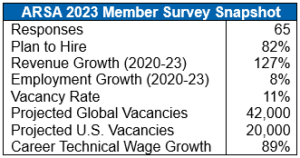 ARSA’s 2023 Member Survey, which is conducted during the first quarter of each year, found that the aviation maintenance industry rebounding from COVID business disruptions and anticipating growth despite global uncertainty.
ARSA’s 2023 Member Survey, which is conducted during the first quarter of each year, found that the aviation maintenance industry rebounding from COVID business disruptions and anticipating growth despite global uncertainty.
Respondents reported a 127 percent surge in revenue between 2020 and 2022. Large organizations – those with revenues of more than $1 billion –doubled revenues from pandemic lows. Overall, the median growth over the period was 26 percent, with only a minority of respondents lagging.
Not unexpectedly, the industry’s workforce is not growing at the same pace as business activity. Reported global employment increased eight percent since 2020; with U.S. firms’ workforces grew by 15 percent. This data reflects rebalancing by companies that were able, thanks to government intervention (for which ARSA was particularly vocal with American policymakers), to retain more personnel during the downturn.
The aerospace community continues to face challenges finding and retaining technical talent to sustain long term growth. Of the shared projections for market and hiring activities, the vast majority expect revenue growth (75 percent) and hiring (82 percent) in the coming year. Respondents also reported a vacancy rate of 11 percent in the industry’s overall workforce. Expanding this data across the international market’s nearly 400,000 maintenance employees, a shortage of approximately 42,000 individuals (20,000 in the United States) to meet current demand is projected.
New hires, once found, will enter a career in which wages nearly double between entry level and top end positions, with the highest-paying ARSA members reporting technical salaries exceeding $185,000 for full time employment.
As reported in ARSA’s Global Fleet & MRO Market Report, released by Oliver Wyman during the association’s 2023 Annual Conference, expectations of industry growth will face constraints. Survey respondents highlighted recruitment and global economic uncertainty as top challenges. Regulatory concerns, particularly related to maintenance instructions and supply chain impacts (e.g., parts documentation limitations), continue to plague and limited business opportunities.
ARSA remains popular with its most engaged members: Respondents rated the association 4.66 out of five in terms of satisfaction and most value access to its expertise and regulatory compliance support.
Quick Question – Untangling the Supply Chain
The “supply chain” has become a common excuse for business problems. From the absence of a chosen product from your corner store to a complete disruption of a global industry, supply chain inadequacies have replaced the pandemic from which they emerged as the primary knee-jerk explanation for any operational shortcoming.
ARSA is working on multiple projects in support of both U.S. government analysis and European aviation policy engagement. Help the association gather some data about the realities of supply chain dependability (or lack thereof) in this month’s “quick question”:
Note: The question is displayed in its own, embedded window. If the “Submit” button is not visible on the screen, you must scroll within the survey window in order to submit your response.
If the embedded survey does not appear/load, open the survey independently by visiting: https://www.surveymonkey.com/r/qq-supplychain.
Click here to see what questions have been asked and answered…and keep a lookout for more.
Welcome & Welcome Back – New & Renewing Members
ARSA’s members give the association life – its work on behalf of the maintenance community depends on the commitment of these organizations. Here’s to the companies that joined or renewed in April:
New Members
Arinwine Aircraft Maintenance Services, LLC dba F&E Aircraft Maintenance, R03
Aviation Repair Technical Inc., R01
Calibro Avionics, LLC, R01
Lycoming Engines, R03
Renewed Members
Advanced Composite Structures Florida LLC, R03, 2015
Aero Systems, LLC , R01, 2022
Air Transport Components, LLC, R03, 2015
Aircraft Electric Motors, Inc., R04, 1984
All Nippon Airways Co., LTD, Assoc, 2001
Erickson Incorporated dba Erickson Air-Crane, R05, 1997
Lufthansa Technik AG, Corp, 2001
Pac West Helicopters, Inc., R01, 2009
SAFETECH USA, INC., R02, 2002
Southwest Aerospace Technologies, LLC, R01, 2019
TAE Aerospace, Inc., R01, 2019
Triumph Airborne Structures, LLC, Corp., 2003
A Member Asked…Am I Crazy?
Q: I just moved to a new company, with a new FSDO, and the experience has been jarring. My entire career so far, I’ve understood that compliance requirements are in title 14 of the Code of Federal Regulations. My “new FAA” insists I must comply with standards in Advisory Circulars or Order 8900.1 that are unsupported by the rules. This dependence on guidance instead of the regulations is repeated in the Data Collection Tools (DCTs), which repeatedly cites ACs or Orders as the required standard without any actual regulatory citation. I’m a new member and so seeking at least a sanity check from ARSA: Have I been missing something all these years?
A: Welcome to ARSA’s membership; as you are exposed to more of the association’s communications you will see repeatedly that this is a primary focus of ARSA’s advocacy with the FAA and a strong encouragement to certificate holders: Do not let the government “legislate by guidance.”
You are absolutely correct that the minimum standards for compliance are the rules of 14 CFR. Agency guidance materials, both for the public (e.g., ACs) and for government personnel (e.g., Orders) are meant to support compliance but cannot create requirements that do not exist in the plain language of the regulations. ARSA routinely highlights in written communication with the agency that each AC begins with the admonition that it provides an acceptable means…but not the only means…of meeting the standards of the rules. The DCT’s are also quite problematic for exactly the reason you describe: Many of the so-called requirements to which certificate holders are forced to answer are without a regulatory citation.
Pushing back against misguided (and unfounded) mandates made by inspectors is both a regulatory and business exercise that takes both patience and careful documentation. For ARSA’s part, Executive Director Sarah MacLeod is pushing ahead with a years-long effort to refocus FAA guidance on the plain language of the rules. Read the final report of the ARAC working group Sarah co-chaired and see the next steps being advanced – you can find details at arsa.org/145-task.
If you’re interested in the association’s general principles related to “building a professional relationship with the government” (which is the underlying matter in handling disagreements over basic compliance standards), you can check out the related training session at arsa.org/dealing-gov-training. The page also includes references to resources that you received during your onboarding process that can be used to document communications with the FAA to track long-term problems and seek resolution (when it’s necessary) by escalating disagreements.

Make ARSA’s Voice Your Own: Advertise
ARSA has a menu of advertising opportunities for arsa.org, the hotline and the ARSA Dispatch. Take advantage of these great opportunities today to showcase your company, a new product or event. For more information go to arsa.org/advertise.
Stand Up for ARSA
In order to provide world-class resources for its members, the association depends on the commitment of the aviation community. By sponsoring events and activities, supporters can help ARSA’s work on behalf of repair stations to endure.
Need a place to start? For information about opportunities, contact Vice President of Operations Brett Levanto (brett.levanto@arsa.org).
Resources
ARSA strives to provide resources to educate the general public about the work of the association’s member organizations; should you need to provide a quick reference or introductory overview to the global MRO industry, please utilize AVMRO.ARSA.org.
About ARSA PAC
ARSA’s Political Action Committee helps elect congressional candidates who share ARSA’s commitment to better regulation and a strong aviation maintenance sector. But ARSA is prohibited from sending PAC information to members who haven’t opted in to receive it.
Careers in Aviation Maintenance
How do you share the industry’s story with the people who could be its future? Teach them about the great work done every day to keep the world in flight. (Even if we can’t recruit somebody, we sure can make them thankful for our work.)
U.S./EU Maintenance Annex Guidance
See all of the association’s public updates since 2012 on the Maintenance Annex Guidance between the United States and European Union. The page focuses in particular on matters related to parts documentation issues arising since MAG Change 5 was issued in 2015.
Industry Calendar
| Conference | Dates | Location |
| EBACE 2023 | 5/23-25/2023 | Geneva, Switzerland |
| FAA-EASA International Safety Conference | 6/13-15/2023 | Cologne, Germany |
| Paris Air Show | 6/19-25/2023 | Paris, France |
| MRO Beer | 6/14-15/2023 | Warsaw, Poland |
| LBACE | 8/8-10/2023 | Sao Paulo, Brazil |
| MRO Asia-Pacific | 9/26-28/2023 | Singapore |
| Dubai Airshow | 11/12-16/2023 | DWC, Dubai Airshow Site |
| MRO Southeast Asia | Spring 2023 | TBD |
| ARSA Annual Conference | 3/12-15/2024 | Arlington, Virginia |
| AEA International Convention & Trade Show | 3/19-22/2024 | Dallas, Texas |
| NBAA Maintenance Conference | 4/30/-5/2/2024 | Portland, Oregon |
the hotline is the monthly publication of the Aeronautical Repair Station Association (ARSA), the not-for-profit international trade association for certificated repair stations. It is for the exclusive use of ARSA members and federal employees on the ARSA mailing list. For a membership application, please call 703.739.9543 or visit arsa.org/membership/join. For information about previous editions, submit a request through arsa.org/contact. This material is provided for educational and informational purposes only. It does not constitute legal, consulting, tax or any other type of professional advice. Law, regulations, guidance and government policies change frequently. While ARSA updates this material, we do not guarantee its accuracy. In addition, the application of this material to a particular situation is always dependent on the facts and circumstances involved. The use of this material is therefore at your own risk. All content in the hotline, except where indicated otherwise, is the property of ARSA. This content may not be reproduced, distributed or displayed, nor may derivatives or presentations be created from it in whole or in part, in any manner without the prior written consent of ARSA. ARSA grants its members a non-exclusive license to reproduce the content of the hotline. Employees of member organizations are the only parties authorized to receive a duplicate of the hotline. ARSA reserves all remaining rights and will use any means necessary to protect its intellectual property.
© 2023 Aeronautical Repair Station Association





